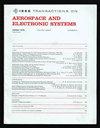拴系卫星编队在规定性能下的最小估计:一个统一框架
IF 5.7
2区 计算机科学
Q1 ENGINEERING, AEROSPACE
IEEE Transactions on Aerospace and Electronic Systems
Pub Date : 2025-01-06
DOI:10.1109/TAES.2025.3526117
引用次数: 0
摘要
由于复杂的软约束(如系绳约束)和有限的有效载荷能力,系绳卫星编队的状态估计面临挑战。本文提出了一种统一的TSF估计框架,具有最小的传感器设计和规定的性能保证。该框架利用软约束最小化所需传感器的数量,同时保证弱局部可观察性和规定的性能指标。这是通过基于学习的约束滤波器(LCF)、非线性可观察性分析和后验cram本文章由计算机程序翻译,如有差异,请以英文原文为准。
Minimalist Estimation Under Prescribed Performance for Tethered Satellite Formations: A Unified Framework
The state estimation of tethered satellite formations (TSFs) faces challenges due to complex soft constraints (e.g., tether constraints) and limited payload capability. This article proposes a unified estimation framework with minimalist sensor design and prescribed performance guarantees for TSF. This framework leverages soft constraints to minimize the number of sensors required while guaranteeing weak local observability and prescribed performance metrics. This is achieved using a learning-based constrained filter (LCF), nonlinear observability analyses, and posterior Cramér–Rao bound calculations. The uncertainties inherent in soft constraints are modeled as a Gauss–Markov process, and the colored noise is converted into Gaussian white noise using the measurement differencing method. The designed LCF integrates soft constraints into an extended Kalman filter as pseudo-observations, and the updated state is then compensated online by the filtering error using an adaptive radial basis function neural network. Moreover, the stability analysis confirms that the estimation error of the designed LCF remains bounded. To validate the proposed framework and designed filter, a symmetrical-type TSF is investigated as an application case, revealing a surprising finding about the minimal sensor configuration.
求助全文
通过发布文献求助,成功后即可免费获取论文全文。
去求助
来源期刊
CiteScore
7.80
自引率
13.60%
发文量
433
审稿时长
8.7 months
期刊介绍:
IEEE Transactions on Aerospace and Electronic Systems focuses on the organization, design, development, integration, and operation of complex systems for space, air, ocean, or ground environment. These systems include, but are not limited to, navigation, avionics, spacecraft, aerospace power, radar, sonar, telemetry, defense, transportation, automated testing, and command and control.

 求助内容:
求助内容: 应助结果提醒方式:
应助结果提醒方式:


